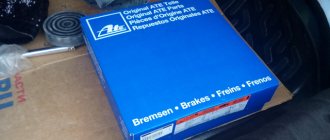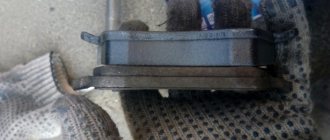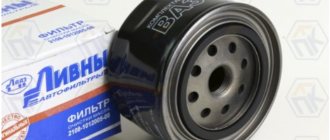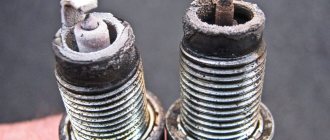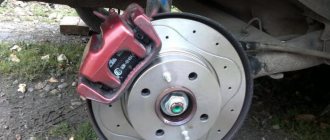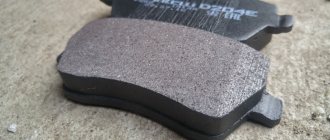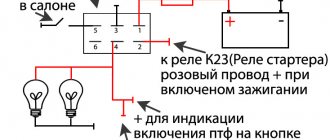On Lada Vesta cars, the front brakes are disc, which means replacing not only the brake pads, but also the discs. This happens many times less often than in the case of pads. For most owners, the brake disc is still usable after 100 thousand kilometers. The resource of this element depends on the driving style of the individual driver, so relying on mileage in this matter will not be entirely correct. The need to replace the brake disc is determined based on the current condition. For example, AvtoVAZ recommends replacing a disc whose thickness is less than 19.8 millimeters. In addition, a spare part whose surface has deep risks will also be sentenced to replacement. Keep in mind that the replacement is carried out comprehensively; you cannot change the disc on only one wheel - this will lead to uneven braking and the car skidding to the side. It is also highly recommended not to grind the disc to remove the lip; this seemingly harmless procedure can have a detrimental effect on the brake system of the Lada Vesta.
What front brake discs can be installed on Lada Vesta
There is always a choice between two types of car parts: original or analogues. The choice must be made taking into account a number of factors:
- budget;
- vehicle operating mode;
- installed pads;
- brand quality.
Original parts are relatively expensive. Therefore, if you are on a limited budget, it is worth purchasing an analogue. But it is important to consider: its quality in most cases is noticeably lower. But this does not apply to all brands. Some famous ones (Ferodo, TRW and others) offer products that are almost as good in quality.
The operating mode affects the wear rate. If the driver practices an aggressive style, you need to go for more expensive models. Usually their resource is an order of magnitude greater. This will allow you to delay the next replacement of parts to the maximum. Lada Vesta is a budget car, but it allows you to accelerate to 180-200 km/h.
Some discs wear out quickly when exposed to ceramic pads. This point is important to consider. The optimal solution: purchase pads and discs from the same brand. This applies to front and rear brakes.
Reviews
| № | Positive |
| 1. | Gennady (otzovik.com): mileage 80,000 km, brake circuit is working, replaced the front pads once. |
| 2. | Vladimir (www.zr.ru): the brakes in the Lada Vesta are effective, they work quickly, there are no comments. |
| 3. | Sergey (autobann.su): the car is two years old, no capital investments. I carry out technical inspections in a timely manner and buy original consumables. |
| 4. | Vladimir (lada-vesta.net): there are no special comments on the TD, the quality is good, but when sand gets into the caliper, a metallic creak and grinding sound is heard. The spacer plate and pads are covered in rust. |
| 5. | Dmitry (otzovik.com): review of the car is positive. I've been using Lada Vesta for two years and have no particular complaints. |
| 6. | Semyon (www.zr.ru): I noticed that in the rain the effectiveness of the brakes decreases, the pedal increases free play. |
| 7. | Maxim (autobann.su): before the Lada Vesta there was a Granta, the quality of the latter is not the best. Well done engineers, they finalized the model properly. |
| 8. | Georgy (lada-vesta.net): actual mileage is 74,000 km, the condition of the hub mechanism and steering knuckle is good, production is minimal. TC and TD are worn out by 60%, reserve is at least 15%. |
| 9. | Stepan (otzovik.com): I am pleased with the quality of workmanship and assembly of the car. There were no major breakdowns; minor ones were fixed on my own. |
| 10. | Vladimir (www.zr.ru): comrades recommended installing brake system elements from Renault Megane, they say the quality is better there. Not ready for large-scale spending yet. |
| 11. | Alexander (autobann.su): the car is two years old, standard equipment, no comments, the interior is quiet, the suspension is strong. |
| 12. | Mikhalych (https://forumvesta.ru): I’m proud of my domestic car; in three years of active use it has never let me down. Good brakes are a guarantee of safety on the road. |
| Negative | |
| 13. | Konstantin (www.zr.ru): as soon as it rains, the discs immediately creak, no matter what I did, it didn’t help. The dealer refuses to replace it due to a non-warranty issue. |
| 14. | Vitaly (otzovik.com): after purchasing the Lada Vesta, I immediately replaced the original TCs and TDs with imported ones. The quality of domestic spare parts leaves much to be desired. |
| 15. | Grigory (autobann.su): the rear drums turned out to be defective, replaced under warranty from an official dealer. |
| 16. | Kirill (lada-vesta.net): if possible, replace original disks and drums with imported ones. The service life of Russian ones is short. |
Related link:
Typical faults of the Lada Vesta suspension.
Substitutes
The choice of front discs for a Lada Vesta car is complicated by the extensive list of brands that produce such units. The most popular and well-proven:
| Name | vendor code | Cost, rubles |
| NF | NF1699131 | 1200 |
| Swag | 60924165 | 2000 |
| BREMBO | 09907875 | 9800 |
It should be noted that some front discs from third-party manufacturers are not inferior in their characteristics to the original ones. An example is Brembo. But it is better to focus on the originals. Their price is low.
Review of Manufacturer Prices
| Catalog article of the brake disc Lada Vesta | Price in rubles |
| Front TD | |
| Original Lada Vesta (8450031577) | From 2500 |
| Analogs | |
| NF (NF1699131) | From 1500 |
| Swag (60924165) | From 1800 |
| Brake discs Lada Vesta Brembo (Brembo) (09907875) | From 3200 |
| Rear TB | |
| Original Lada Vesta, X-Ray(8450031131) | From 4000 / set |
| Analogs | |
| NK (202264) | From 1400 |
| Valeo (297764) | From 1800 |
| JURID (561997JC) | From 1850 - 1900 |
| Rear brake discs for Lada Vesta ATE | From 2700 - 2900 |
| *prices are as of 04/08/2019 |
Front disc dimensions:
- Thickness: 19.8 mm.
- Height: 44 mm.
- Number of holes: 4.
- Diameter: 260 mm.
- Allowable wear: 11.2 mm.
Which rear brake discs to install on Lada Vesta
This car differs from many in its price category by the presence of rear disc brakes. Which has a positive effect on speed, controllability, and maneuverability. At the same time, if necessary, replacement will not be difficult.
You can purchase both analogues and originals for replacement. The cost of the latter differs significantly from analogues. Sometimes 3-4 times. Moreover, wheels from Lada Largus and some other cars are suitable for Vesta.
As in the case of the front ones, the question arises: which is better to buy: original or analogues? There is no clear answer to this. You should be guided by the budget and other factors.
How to spot a fake
This brand has proven itself well. That is why situations often arise when counterfeits are made for it. But they can almost always be recognized. There are a number of signs by which you can easily identify them:
- the packaging contains inscriptions only in Russian, as well as in English - the presence of prints with hieroglyphs indicates counterfeit;
- transportation and sale - exclusively in high-quality cardboard with color printing (if the cardboard falls apart at the seams in your hands, then most likely it is a fake);
- On the disk itself, its end is stamped with a special number and the name of the manufacturer.
For VAZ cars, the use of these discs is preferable. According to the company, analogues of parts with equally high quality are not produced in the Russian Federation.
Original
It should be noted that the originals on the rear wheels take relatively little time to maintain. But it all depends on the operating mode. If emergency braking is used frequently, the car will quickly wear down the rims. The original ones may not be enough for 40 thousand km. In a quiet driving mode, they “go” up to 100 thousand km.
| Name | vendor code | Cost, rubles |
| Rear brake discs X-Ray, Vesta | 8450031131 | 4 thousand rubles for a set of 2 pieces. |
Replacing drum brakes with disc brakes Lada Vesta
The Lada Vesta braking system consists of brake mechanisms and electronic driver assistance systems. The car is equipped with disc brakes at the front and drum braking devices at the rear. Every owner should know what rear brakes are installed on the Lada Vesta and how to service them.
Main differences between disc and drum
The braking mechanism consists of several parts and differs in two types of design.
The disk unit has an open design, allowing the device to operate for a long time without overheating.
When you press the brake pedal, the brake pads are pressed against the disc mounted inside the wheel rim using a caliper.
The degree of compression of the disc by the calipers is very high, which allows the car to brake more efficiently. As a result of heavy loads, the mechanism has a relatively short resource.
The drum mechanism has a closed cylindrical body, which prevents the entry of dirt and dust and has a long working life. The brake pads are pressed against the inner surface of the drum, causing the car to stop. The pressing force of the elements is comparatively lower than that of analogues with a disk, therefore such mechanisms are considered less effective.
The combination of front discs and rear drums is optimal in terms of efficiency and durability. This version of the Lada Vesta justifies itself with its reasonable price and reliability.
Rear brakes on Lada Vesta
Each car enthusiast can decide for himself whether to install drum or disc rear brakes on his car. He will not feel much difference from replacing the elements.
Replacing drum brake pads
Before starting work, the handbrake lever should be completely lowered down. The installation process has its own procedure:
- remove the rear wheel;
- using a slotted screwdriver, unscrew the ratchet nut that adjusts the length of the spacer bar;
- remove the block and replace it with a new one;
- install the drum back;
- tighten the bearing nut.
DIY car arch repair video
Replacing the pads involves installing them on both wheels at the rear, otherwise the car will brake with different forces on the wheels and may lose control.
Lada Vesta rear brake pads must be replaced every 50-60 thousand km. But this does not mean that they do not require additional periodic inspection.
Approximately every 15-20 thousand kilometers, it is necessary to inspect the important parts of the car. It is not recommended to buy spare parts at street car markets; there is a possibility of stumbling upon a low-quality product.
The cost of a set of rear brake pads for a drum is about a thousand rubles.
Analogs
It should be noted that purchasing similar parts will not cause problems. There is a wide selection of different manufacturers available. TRW, Brembo and others produce parts of this type. It is only important to familiarize yourself with prices and reviews in advance. Don't forget about the need to select the right pads. Another nuance is that it is important to consider the dimensions. Sometimes analogues are a little thicker. Which can cause some difficulties and difficulties during installation.
| Name | vendor code | Cost, rubles |
| N.K. | 202264 | 1.3 thousand rubles |
| Valeo | 297764 | 1.9 thousand rubles |
| JURID | 561997JC | 1.8 thousand rubles |
Replacing front brake discs
You will need an 18 mm wrench, a ratchet and an extension cord, and a socket. You can do without an extension, but it will be very inconvenient to unscrew the bottom bolt. It looks like this:
The replacement process includes the following steps:
- using the thorax, a pair of bolts holding the disk in place is unscrewed;
- the disk is carefully removed from its seat;
Sometimes the disc won't budge. In this case use:
- WD-40 – allows you to cope with “soured” threads;
- hammer - light tapping will allow you to “tear off” the bolt or nut.
Installation will be performed in reverse order. The final stage is bleeding the brakes.
Engine
There are a lot of complaints about the engine. For some reason, the same engine mounts are installed on Logans, and they remain there for the entire service life. No one had any trouble with them. On Vesta, everyone struggles with the same supports, they start knocking. I think there is an error in the design, or the fourth support is missing. When you start it, the engine vibrates.
I'm going to change the timing belt kit in a week. I want to do everything myself. The only thing I don’t like is the TZA pump, there are a lot of complaints about it. At 50 thousand, the impeller breaks, antifreeze leaks, and jams. The Gates belt performs well. AvtoVAZ gives it a guarantee of 180 thousand. But the pump or the roller may jam. I drove 75 thousand, but still decided to change the timing belt and ordered a Gates kit.
Many people complain that the 1.6 liter engine eats up oil and the pistons knock. I did not notice any piston knocking or lubricant consumption. I fill it with Shell Helix Ultra and put the filter on Mann. Perhaps oil consumption is related to driving mode. Many people drive in creeping mode, keep the revs to a minimum, and save fuel. But this spoils the engine, which does not like low speeds. It is advisable to switch to 2500 rather than crawl.
The plant gives an engine life of 220 thousand. It is repairable, the block is cast iron. I can also say that there may be oil leaks from under the valve cover or pan. My engine has already been modernized, but I don’t particularly like the Euro-5 firmware.
Replacing rear brake discs
The replacement algorithm is simple. The wheel is removed and the car is raised on a jack or lift. Main stages:
- a tool is prepared to remove the disc from the hub (it works simply - the central part rests on the axle, the rest presses on the disc);
- the bolt attaching to the hub is turned out;
- After removal the mechanism looks like this:
The problem is caused by the disc fixation bolt on the hub. It is important to unscrew it carefully. Due to the design features, the edges are “collapsed”. Which makes it impossible to unscrew the bolt. Before the dismantling procedure, you need to spray the connection with WD-40.
Assembly is performed in reverse order. During the replacement process, it is advisable to evaluate the condition of the remaining parts. This applies to the boot and pads. It is important to clean the calipers from dirt and rust. Threaded connections are lubricated with graphite lubricant. This will avoid oxidation and jamming of the threaded connection.
The nature of the malfunctions can be noted:
- Uniform wear - it manifests itself in the fact that the friction layer is worn evenly, this shows that the brakes are working well.
- Severe wear of the friction layer, brake rivets are visible - this means that you have been using the “outdated” parts for too long. The rivets could damage the disc, so it would be a good idea to inspect it for damage.
- The friction layer is worn evenly around the entire circle, but one of the sides is worn out more than the other - one of the parts of the brake system (guide or piston) does not distribute the braking force correctly. Cleaning all “live” parts and applying a new layer of lubricant will help. Naturally, everything will have to change.
- Both components are worn unevenly, the surface is strewn with irregularities and roughness. The reason for this outcome is a malfunction of the caliper guide pins - they swing and do not give an even trajectory of movement. You will have to clean them, then reapply lubricant.
- The friction lining is cracked - in this case, the “trouble” is caused by the brake discs themselves - they wear unevenly. Everything will have to change.
- Uneven wear of the friction layer means that the parts were installed incorrectly. They will have to be changed.
After performing a visual inspection of the damage, you can independently make a verdict about the breakdown. And besides this, there are several other signs by which you can find out about a faulty front pad while sitting behind the wheel.
